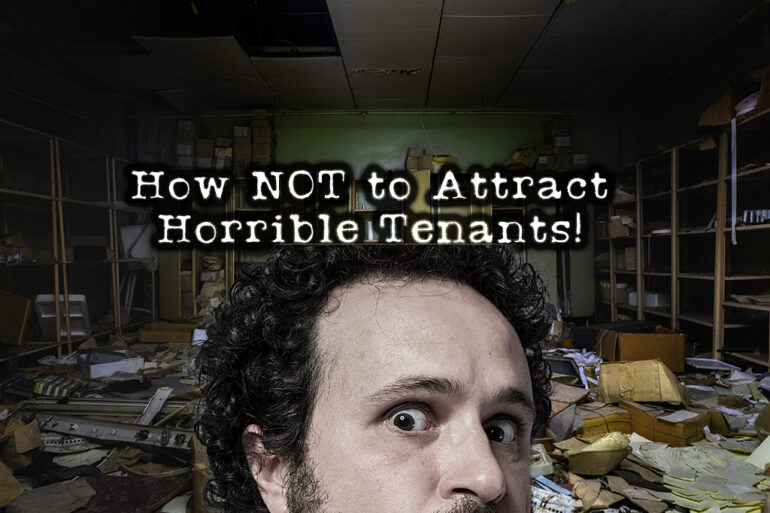How NOT to Attract Horrible Tenants to Your Rentals
Have you ever asked yourself, “How in the blue hell did I end up with this bad tenant?” You know, the one you want to snatch out of your rental unit with your bare hands for committing frequent violations?
Yes, this is the occupant who throws loud, late-night parties that disturb the other renters around them. This is the lessee who is always trying to find a reason not to pay their rent (and do their best to make it appear to be your fault that they aren’t doing so). This is the sneaky tenant who is housing squatters in their unit.
Landlords are often shown in a bad light when it comes to issues with problem renters. The truth is that many of them are nice people who are being wronged by the folks they are renting to. How can you make sure you don’t attract these bad tenants in the first place?
How Landlords Can Avoid Attracting Bad Tenants
When it comes to tenants committing a lease violation (such as housing squatters, a current Miami-Dade County rental issue), there is one foolproof way to stop it before it starts — put it in the lease agreement! The American Apartment Owners Association suggests making your lease agreement “ironclad.” Make sure the tenant understands the provisions and rules of the property clearly beforehand.
That being said, during the application process, you should give your future tenant an in-depth screening before they sign the lease. You can ask for references from past landlords and/or do background checks on those who will be living in the rental unit.
Always consider the applicant’s rent-to-income ratio before approving them. This critical ratio is a great way to quickly evaluate if the tenant can afford your monthly rent. The standard ratio is that rent should be no more than 30% of the tenant’s monthly income.
If the ratio is greater than 30%, then you may want to consider a more financially stable applicant. Please keep in mind that 30% is very conservative, and you can adjust this formula to suit your risk tolerance as a landlord. Do you mind banging on doors for the rent once in a while? Fine, then lower that number to 20% and happy knocking!
When a potential renter initially sees the ad for your apartment for rent, the presentation of the ad makes a big impression. If it’s just scribbled with a Sharpie on cardboard and thumbtacked to the wall at your local laundromat, then whoever is interested in the rental won’t immediately think of the rules they will need to follow before they give you a phone call!
This is not to say that you shouldn’t hang the apartment flyer at that laundromat, especially if you wash clothes there yourself. Hell, you might spontaneously run into the perfect renter checking out your ad one afternoon while pulling your drawers from the dryer!
Wherever you post your ad, whether in your neighborhood or online, you should make it look professional, like you actually care about the property you’re about to rent out. Pendo, a property management platform that makes life easier for landlords, suggests you state directly on the ad that you will be conducting things like background checks, and that you describe in detail the type of tenant you are looking for (professional, student, etc.).
Another tactic you could use as the landlord is to charge a higher security deposit. This is one of the simplest ways to weed out bad tenants from good ones. It will also motivate the lessee to keep the apartment clean and free of damages — they’re gonna want all of that money back upon their departure!
If you’re in the Sunshine State, then you’re in luck. There are no limits on how much you can charge for a security deposit! Not that you should charge 5x the monthly rent as a deposit, but it’s good to know you can ask what you want.
Also, you should never tell a potential tenant if your rental has been vacant for a long period of time. This can make you look like you are desperate to rent it out and could imply that you will be lenient when it comes to the rules they should follow while they inhabit the dwelling.
The Bad Tenant Situation in Miami-Dade County
By definition, a “squatter” is a person who is living on land or property illegally. Apparently, many of the tenants in Miami-Dade who are currently protected from being evicted are allowing squatters to live in their residences, and city commissioners have been receiving thousands of complaints about it lately.
This is because of the Miami-Dade County Eviction Moratorium. It basically states that, if a person makes less than $99,000, can’t pay rent due to loss of income (such as the job impact of COVID-19), has tried their best to pay the rent and/or get government rental assistance, or will become homeless if evicted, then that renter can’t be evicted if they give their landlord a signed declaration.
According to recent reports from WPLG Local News 10, the Miami-Dade County area is currently the only place in Florida where the cops aren’t allowed to carry out eviction orders that were given by judges.
Daniella Levine Casa, the current mayor of Miami-Dade County, has been blamed for enforcing the eviction restrictions. She’s stopping local law enforcement officials from executing court-issued writs across the county.
“We are not preventing the removal of squatters,” she said publicly. “Squatters are removed by police if they have no legal right to be present. So it’s not a matter for the courts, it’s really a matter for the police.”
You can see how this could frustrate the hell out of any landlord who may depend on rental payments as a main source of income! The good news is that relief is on the way for both landlords and tenants in Miami-Dade County who have been suffering financially during the pandemic, according to South Florida’s Sun Sentinel Newspaper.
Follow Your Gut
After doing all the routine things (such as checking for a US identification and SSN and/or deciding if you will require them to get renters insurance, income verification etc.), you should depend on one more thing when determining if you’ll rent to a person — your own landlord instincts!
Those who have been a landlord for some time and have had both good and bad tenants know that funny feeling that may come about when considering particular renters, even if their background and other requirements look good.
If you’re going with your gut when deciding whether to rent to otherwise qualified renters, be sure that you’re not discriminating against them based on things such as race, religion, or sexual orientation. If you do, and the potential renter feels like you are, you could be in for a whole other type of headache!








